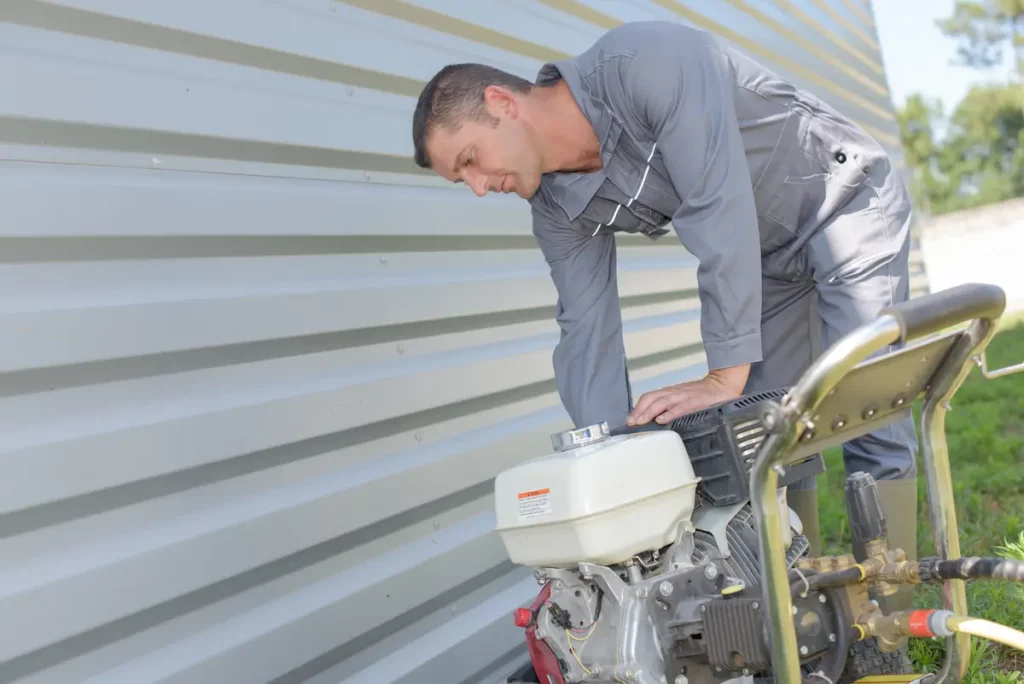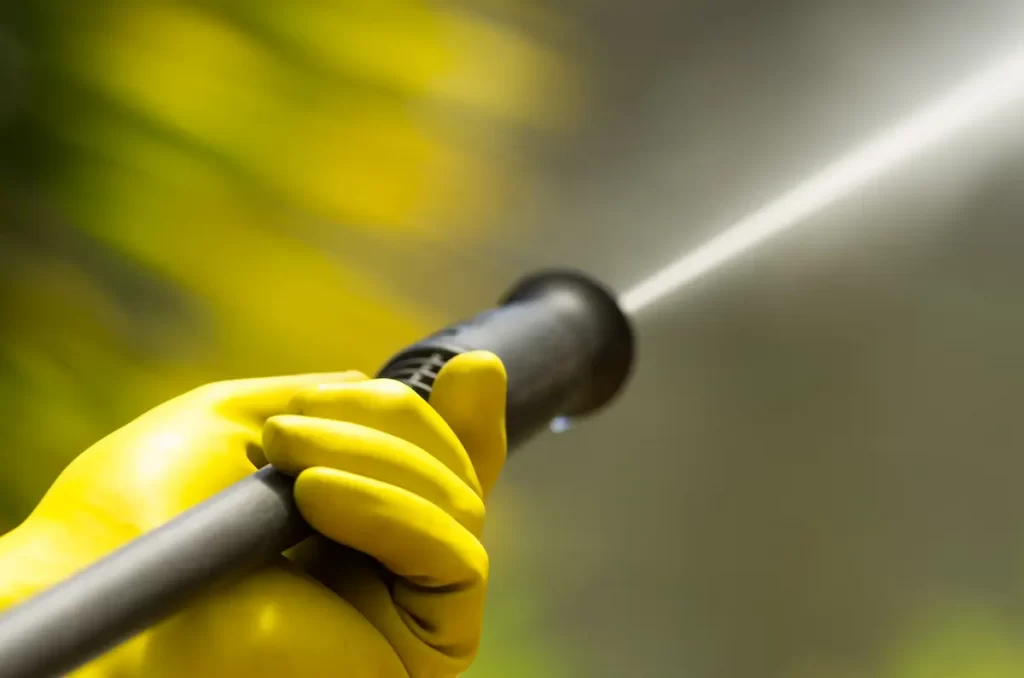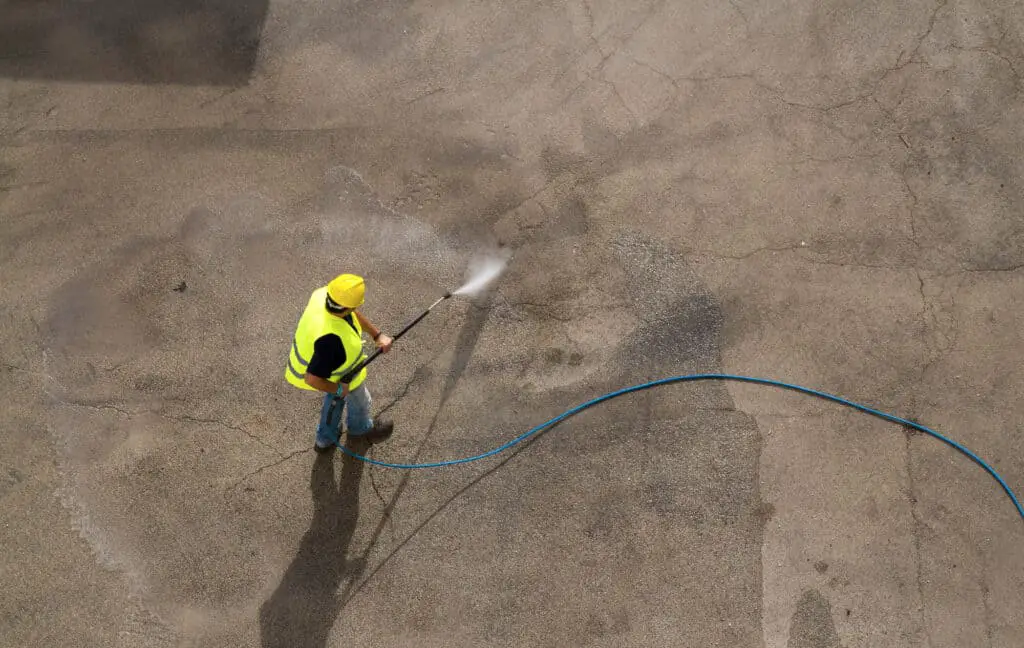What do you do if your pressure washer won’t start?
Starting issues may vary depending on the pressure washer you use.
For instance, electric washers may have power or electrical faults, while gas washers may have start faults such as blocked gas lines or old fuel.
When your machinery fails to start, it can be extremely frustrating.
Pressure washers are no exception to this.
However, most starting troubles with your washer can be attributed to a few common issues.
If you have a good understanding of these issues, it can help alleviate the frustration you feel.
You can save money on unnecessary repair costs by learning to diagnose and address common problems with your washer.
Continue reading to identify why your pressure washer won’t start and how to troubleshoot the issue.

Related Reading: 11 Crucial Pressure Washer Safety Tips You Must Follow: Blast with Care
Table of Contents
Common Issues With Electric and Gas Washers
The engines of gas and electric washers have similar components.
When these parts fail, it can cause the washer to stop working.
Spark Plug
A faulty spark plug should be considered one of the first diagnostic steps to determine why your pressure washer won’t start.
Have a look to see if there is any damage to the plug.
Typical issues are:
- Dirty Plug: Don’t try to clean the plug. Swap it out for a new one.
- Cracked Plug: This is caused by one of the electrodes inside the unit burning away or becoming damaged.
- Faulty Plug: Put the plug into a tester. You must get a new plug if there is no spark from the terminal.
As part of your maintenance routine, you should check your spark plugs.
Doing so will minimize the chance of this contributing to why your pressure washer won’t start.
Ignition Coil
This part of your pressure washer sends voltage to the spark plug.
If you have confirmed that the spark plug is not the issue, you should check the ignition coil.
Utilize an ignition coil tester.
A faulty ignition coil can be easily replaced.
Flywheel Key
Your washer’s flywheel key can become old and fragile through wear and tear.
That can lead to the key breaking or shearing while using your washer.
Another way the flywheel can be damaged is if pressure hits a hard surface.
The flywheel can break in half. That will cause your washer’s engine to stop.
This is information from Briggs and Stratton on how to inspect the flywheel key to your pressure washer.
Remember, when cleaning a surface and finding that your pressure washer has suddenly cut out, consider that your flywheel may cause it.
You can replace the flywheel with a new one.

Electric Pressure Washer Won’t Start
Most of the reasons an electric pressure washer won’t start can be caused by electrical power issues.
However, there can be other reasons why your washer isn’t starting.
Dead Battery
Some electric washers run on batteries.
If your machine won’t start, it may be a battery issue.
Connect a multimeter to the positive terminal.
If it reads lower than the manufacturer’s recommendation, charge or replace the battery.
Connected to the Wrong Outlet
Ensure your washer has enough power by checking if it’s plugged into the right outlet.
Most pressure washers require a power supply of 12 to 14 amps.
If your electrical outlet does not provide that power level, your washer will have difficulty starting.
In this case, you need to use a three-pin plug, which will provide the necessary amount of power to your washing machine.
Faulty Capacitor
It is easy to determine if the washer’s capacitor is starting to fail.
You can do so by listening carefully to the machine while running.
If there is a loud or continuous humming/buzzing sound, it is an indicator that you need to inspect the capacitor.
Another indicator that your capacitor is faulty is bulging or burn marks.
Without this component functioning, your pressure washer won’t start.
Test and replace the capacitor if necessary.
Ground Fault Circuit Interrupter Tripping
The safety feature of grounding in your electric washer can overload your house’s circuit breaker when too many appliances are used simultaneously.
If you find that your washer suddenly cuts out on you, look at the breaker board of your house for any tripped circuit breakers.
The GFCI may have tripped locally at the outlet.
Check the GFCI outlet for the button popping out.
You may have to search around for the GFCI if your pressure washer is plugged into a regular outlet.
Some contractors save money by putting multiple regular outlets into one GFCI outlet.
To avoid tripping your circuit breaker using a pressure washer, switch off or avoid using unnecessary appliances.
Blown Fuse
As your pressure washer ages, the fuses will start to deteriorate due to wear and tear.
If one has blown, then your machine won’t operate.
Check the fuses as part of your investigation of why your pressure washer won’t start.
Your manufacturer’s manual will tell you which type of fuse you need to use.
Swap out the blown fuse with the new one.
Extension Cord
If you use an extension cord over a long distance, you may find that you aren’t getting enough electricity into your washer.
Electric washers are made to operate over short distances (no longer than 25 feet) with extension cords.
If you intend to go further than that, you can still use an extension cord.
If you want a longer cord, make sure that it’s made with 12-gauge wire.
This will deliver you the power that you need over those longer distances.
Tripped Thermal Overload
Your washer is designed to protect itself from overheating.
If the unit gets too hot, it will trip the thermal overload feature.
When this happens, then let your washer cool down for several minutes.
After that, press the reset button.
If that hasn’t resolved the issue, try waiting a while longer and try resetting the machine again.
Contact your manufacturer if your washer does not want to start after it completely cools down.
If you decide a new electric pressure washer is needed, here are a few to check out for your convenience. Amazon Affiliate Link.
Electric-Powered Pressure Washers

Gas Pressure Washer Won’t Start
Fuel-related issues are the main contributors to gas pressure washers not starting. Yet, there can be mechanical problems, too.
Old Fuel
Gas left to sit for several months can lose its potency.
That is due to the fuel oxidizing and turning stale.
The result is a pressure washer that splutters when running or a machine that completely refuses to start.
You can solve the problem by draining the old fuel, washing the fuel tank, and adding fresh fuel.
Consider using a stabilizer to prevent fuel from going stale.
Winterizing all gas-powered tools will help stop this from occurring.
Overheating
A dirty air filter, pinched fuel lines, or tight gas cap can cause your gas washer to overheat and shut down.
Let the washer cool down before restarting.
If it still doesn’t work, refer to the factors mentioned earlier.
A worst-case scenario is that the engine may need overhauling or replacing.
If this is the case, contacting your manufacturer is best to see if you’re still covered under warranty.
There are ways that you can reduce the chance of your washer overheating:
- When using the machine, please place it in a shady or cool area.
- Ensure there is adequate and constant water flow throughout the unit. This will allow the components of your washer to remain cooler.
Clogged Fuel Filter
Dirt and debris can cause havoc if allowed to enter your washer.
The fuel filter is the gatekeeper to keep these particles from entering the combustion chamber.
If your fuel filter is clogged, your pressure washer may not start as the gas will struggle to enter the machine.
By giving your fuel filter a regular clean, you clear the gateway into the combustion chamber for your fuel.
If the filter looks worse for wear, replace it with a new one.
Related Reading: Can You Use Regular Gas in Your Pressure Washer? Smart Advice
Broken Fuel Pump
The fuel pump is an integral part of your pressure washer.
It allows fuel to flow into the fuel rail, which then transfers it to the combustion chamber.
So, if the fuel pump is broken, your gas will never make its way into the combustion chamber.
The result of that is your pressure washer won’t start.
Your fuel pump can be damaged in several ways:
- Overheating: We looked at this problem earlier. Yet, there is another factor to consider. Fuel helps to keep your washer cool. Running out of fuel means your pump cannot remain cool. The result is an overheated fuel pump.
- Clogged Pump: Debris and other particles can enter the pump through the gas tank. When these get stuck in the pump and start building up, it prevents fuel flow.
- Wear and Tear: Your pump may be worn out. Gears that operate the pump may seize up. Now your pump doesn’t work.
Cleaning the pump may be all that is required to have your washer running again. Wash out the dust and debris, then reattach the pump.
Burn marks and physical damage indicate overheating and wear and tear.
Replace the pump to fix these issues.
Stagnant Oil
Oil lubricates the washer components, allowing them to move smoothly and stay cool.
Over time, old oil can cause blockages and prevent smooth movement.
If your pressure washer isn’t lubricating properly, the components can become overheated or seize up.
Both these situations can lead to your pressure washer not starting.
Old oil appears milky.
It would be best if you were replacing your oil at least once a year more often if you use your pressure washer a lot.
Also, check the oil filter.
There can be a build-up in this, which can affect the proper flow of oil into your washer.
Give your oil filter a good clean to remove any sludge.
Related Reading: How Much Oil Does a Pressure Washer Take?
Too Much Pressure
If your washing machine has a pull cord to start, the water pressure can make it difficult to start the machine.
The start cord can be hard to pull if the pump assembly has too much water pressure.
If you are struggling with the cord, gently squeeze the trigger of your spray gun while pulling at the start cord.
I have this related article about why your pressure washer has low pressure. I hope this can help as well.
Clogged Airline
A safety measure of washers is that they won’t start if the airline is blocked.
Typically, this is caused by not priming the washer properly.
You can fix blockages in your spray gun by pulling the trigger to allow water to flow through the line.
When to Call a Professional
We have covered the main reasons your pressure washer may fail to start.
However, there may be instances where you need to seek professional assistance.
If you aren’t comfortable fixing the pressure washer yourself, you should consider taking your unit to a repair shop.
Perhaps you have tried the recommended fixes on this list, yet your machine isn’t starting.
That’s when you need to get the assistance of the experts.
Contact your manufacturer and seek their advice.
Should you need a new pressure washer, here are a few to check out for convenience. (Amazon Affiliate Link)
Final Thoughts
Dealing with a washer that won’t start can be frustrating.
Both electric and gas-powered pressure washers may have issues with spark plugs and flywheel keys, but each type presents its own unique set of problems.
Electric pressure washers revolve primarily around electrical faults such as blown fuses or insufficient power.
Fuel-related problems can prevent gas pressure washers from starting.
Clogged fuel lines and filters can prevent fuel from reaching the combustion chamber.
Stale fuel can also impact the ability of the washer to start.
If you don’t think you can resolve the issue by yourself, contact a local repair agent or your manufacturer.
Related Readings:
